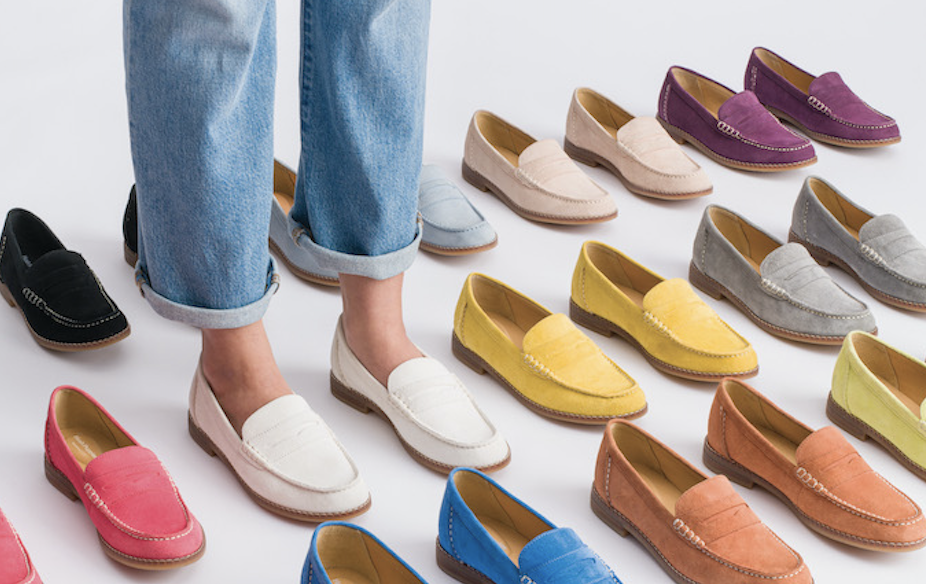How the Pandemic Jumpstarted DSW’s Evolution to a New Warehouse Model and Merchandising Approach

To veterans of Designer Shoe Warehouse, the national shoe retailer has come a long way since its founding in 1991. In the last 30 years, DSW has broadened its inventory, introduced a new omnichannel warehouse concept and grown its fleet of over 500 stores across the U.S. and Canada.
“It’s been a rocket ship in growth,” said Bill Jordan, president of DSW parent company Designer Brands Inc. Since he joined the company in 2006, DSW went from fully brick-and-mortar to launching a thriving digital business. The company also grew its annual net sales to $2.2 billion in 2020.
More from Footwear News
How The Shoe Company in Canada Is Modernizing Ahead of Its 70th Anniversary
Designer Brands CEO Roger Rawlins on Why the Company Isn't Thinking Like a Retailer Anymore
How the Camuto Group Is Bouncing Back With the Relaunch of Vince Camuto
Until 2020, DSW had seen topline growth every year since its founding. The retailer has since rebounded from pandemic-related losses, reporting a net sales increase of 66.9% year-over-year to $817.3 million in its 2021 second quarter earnings call. Despite some losses, 2020 was still a defining year that set the stage for the future of the footwear warehouse.
For decades, women’s fashion was the core of DSW’s business. Though the company had plans to introduce more athletic and athleisure styles in 2019, the pandemic accelerated this pivot in 2020.
As more people took to running, exercising and hiking, DSW executives started to take note of the rapidly shifting needs of the pandemic-era consumer. They changed their business as a result.
“A big part of where consumers have evolved is they embrace an athletic-athleisure lifestyle,” said chief merchandising officer Jim Weinberg. “So we’ve pivoted our assortment to focus on athletic and athleisure.”
In Q2, athleisure penetration grew to 57% in DSW compared to 44% in Q2 of 2019.
“We are killing it in athletic,” Designer Brands CEO and director Roger Rawlins said in an August call with investors. The shift to athletic footwear, while beneficial to the company’s traditionally strong women’s business, has also helped DSW lift sales for all styles across men’s and kids’.
“It’s driving our men’s growth and it’s driving this kid’s growth,” Weinberg said. “And it’s adding a consumer on the female side that we really weren’t addressing before.”
Despite the shift in assortment, DSW has not neglected the categories that put it on the map, namely dress and seasonal, which include sandals and boots. Brands like Steve Madden, Crown Vintage and JLO are still core to the DSW business. In 2018, DSW acquired Camuto Group, which designs and develops the Vince Camuto brand and licenses footwear for Jessica Simpson and Lucky Brand. With a goal to have greater control over its brands, DSW converted most of its private brand design and sourcing to the Camuto platform in 2019.
“There were a lot of synergies there between our DSW customer set and [Camuto’s] product set,” said DSW CFO Jared Poff.
In Q2, Camuto-produced brands were up 88%, with sales of the Jessica Simpson brand up 92% year-over-year. These key brands became the focus of a merchandising strategy for DSW throughout 2020, when DSW decided to whittle down its assortment to include just the top 50 most desirable brands. These brands currently represent about 80% of DSW’s total sales.
To bring brands to consumers, DSW has honed in on an omni-channel experience that leverages brick-and-mortar as well as digital sales. As executives have highlighted previously, DSW stores are located within 20 minutes of 70% of the U.S. population. Since shutdowns in the pandemic, foot traffic to DSW stores has improved. Its digital business has also grown.
“They’re just excited to be back out trying on shoes and expecting an omnichannel experience in a bigger way than probably they were before,” said Melissa Blandford, DSW’s senior vice president of stores and operations.”

Courtesy of DSW Inc.
Now more than ever, customers want all the elements of a true omnichannel experience, including buy online pickup in store, curbside pickup, and in-store returns, Blandford said.
For these, reasons, DSW is focused on optimizing square footage across its store fleet as it implements its “warehouse reimagined” concept. This involves updating store layouts to better marry physical and digital experiences.
As executives explained, DSW warehouses house crucial in-store sales, but they also directly contribute to digital sales, thanks to their roles as billboards, return centers and fulfillment centers. For example, when a region opens a DSW warehouse, digital sales in the region almost always increase, Jordan said. When this happens, order fulfillment can happen quickly, thanks to the product’s close proximity to the consumer.
At the same time, the warehouses still need to offer a pleasurable shopping experience, digital elements aside.
“Coming out of a pandemic, it’s important that our stores are showing up in a really positive, engaging way and making this fun for people,” said Blandford. Shop-in-shop experiences, which are tailored to consumer interests in each market, help serve this purpose. Central product displays in the store also help promote specific brands.
The emphasis on in-store brand promotion has become increasingly relevant as DSW leans into exclusive distribution partnerships. In August, DSW inked a three-year agreement to be the sole wholesale and brick-and-mortar distributor of the Hush Puppies brand in North America beginning in 2022. Hush Puppies, a division of Wolverine World Wide Inc., has a strong international presence but no brand-owned stores in North America.

Hush Puppies
These types of partnerships help DSW establish an element of exclusivity while offering brands the opportunity to utilize the retailer’s vast consumer reach.
“I think it’s a great win-win solution for the brand as well as for our retail brands,” said Poff. “The brands are also trying to access very specific customer sets and trying to access distribution without having to make huge investments.”
Executives said that DSW is open to more of these partnerships in the future, especially as footwear brands increasingly cut ties with different wholesalers to focus on key accounts and direct-to-consumer channels. Since August 2019, Nike has terminated wholesale accounts with many major retailers, including DSW. And Adidas, Under Armour and Crocs have all made similar moves as they look to maintain more control over brand image, distribution and pricing.
With DSW’s recent shift to athletic, Nike’s decision to close its account with the chain could be seen as a major headwind. But according to Jordan, the end of the partnership in fiscal year 2022 will not severely impact sales. He estimated that the Swoosh accounted for under 4% of revenue in 2019.
“The good news for us is that the hole that needs to be filled is not such a big hole that we can’t do it,” Jordan said, noting the selling power of other popular athletic brands, such as New Balance, Skechers, Brooks and Ryka. In some categories, such as women’s running, these smaller brands have actually grabbed market share from Nike in recent months.
To be sure, losing Nike will be a change.
But after 2020, change at DSW is the new status quo.
“There won’t be as many orange boxes on the floor,” Jordan said. “There’s going to be a whole array of brands. And I think that will open up the number of choices we’ll be able to offer customers.”
Best of Footwear News
Everything You Need to Know About the Best Black Friday Shoe Deals of 2021
Nordstrom's Anniversary Sale Is Now Open to the Public — Shop Our 15 Favorite Shoe Deals
Sign up for FN's Newsletter. For the latest news, follow us on Facebook, Twitter, and Instagram.


